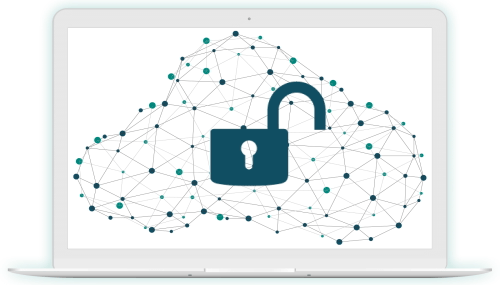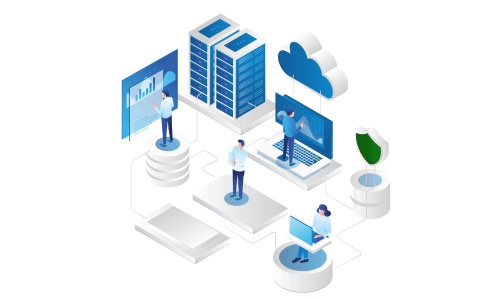In an era where cloud computing has revolutionized how we store, manage, and access data, ensuring the security of this data has never been more vital. 'Cloud Data Security Guide' takes you on a comprehensive journey through the complex landscape of data security on cloud computing. It aims to demystify the common security issues, risks inherent to cloud computing, and the importance of robust infrastructure security. This guide also highlights the crucial role professional development - through certifications and courses - plays in elevating your expertise. Whether you're an aspiring cloud security engineer, an IT professional seeking to deepen your knowledge, or a business owner wanting to safeguard your data in the cloud, this guide serves as your comprehensive resource to understand and navigate the realm of cloud data security.

Understanding Cloud Computing and Data Security
Let's start with cloud computing.
What is Cloud Computing?
Cloud computing, in simple terms, is the delivery of computing services like storage, software, databases, networking, analytics, and more, over the Internet or "the cloud". Instead of owning their own data centers or computing infrastructure, businesses and individuals can access these services on an on-demand basis, similar to how we use electricity from the grid. This allows for cost savings, increased productivity, speed and efficiency, performance, and scalability.
Why is data security crucial in cloud computing?
In the context of cloud computing, data security becomes exceptionally crucial due to the very nature of the service. As data is stored off-premises, typically in a shared environment, it is susceptible to various security risks. Unauthorized access, data breaches, data loss, or leakage can lead to significant business damage including financial losses, damage to reputation, and legal implications. Furthermore, as regulatory requirements for data protection tighten globally, ensuring data security in cloud computing is not just important, it's an absolute necessity.
Common security issues in cloud computing:
- Data Breaches: Possibly the most serious concern in cloud computing, data breaches can expose sensitive information, potentially leading to identity theft, and even corporate espionage.
- Insufficient Access Management: If access controls aren't properly implemented, unauthorized users may gain access to sensitive data or resources.
- Insecure Interfaces and APIs: Many cloud services are accessed through APIs and interfaces. If these are not secured correctly, it can expose the cloud service to a variety of security issues.
- System Vulnerabilities: These are exploitable bugs in systems that attackers can use to infiltrate the system, potentially leading to data breaches or loss.
- Account Hijacking: Attackers might use staff email and passwords to gain access to cloud services. This could lead to the exposure of sensitive information.
- Misconfiguration of Cloud Services: Often due to user error, misconfigurations can lead to unauthorized access, data leakage, and unavailability of services.
- Malware Injections: Attackers can embed malware into a cloud service. Once inside the service, this malware can then move laterally across systems and networks.
- Data Loss: Data could potentially be lost through malicious attacks, accidental deletion by the cloud service provider, or a catastrophic system failure.
- Insufficient Due Diligence: When organizations migrate to the cloud without understanding the cloud environment and its associated risks, they expose themselves to a host of security issues.
- Abuse of Cloud Services: Cloud services could be abused for nefarious purposes, such as hosting malicious software, or for launching attacks on other systems.
Unraveling Security Risks in Cloud Computing
When moving to cloud computing, organizations need to be aware of a range of potential security risks. These risks can have far-reaching implications for businesses, making it critical to understand and manage them effectively. Let's take a closer look to the risks that we listed above.
One of the most significant risks associated with cloud computing is data breaches. A breach can lead to substantial financial losses, reputational damage, and regulatory repercussions. Breaches can result from a variety of factors, including insufficient access management, insecure interfaces and APIs, and account hijacking. It's important to ensure robust access controls, secure all interfaces, and implement strong account security measures to mitigate this risk.
Another common risk is that of system vulnerabilities. These are exploitable bugs in systems that attackers can use to infiltrate your data. Regular security assessments, vulnerability scanning, and timely patch management are essential in mitigating this risk.
Misconfigurations are a major source of cloud security incidents. Accidental exposure of data, unauthorized access, or service disruptions can occur due to user error or poor configuration practices. Organizations should enforce strict configuration management practices and invest in automated tools to detect and correct misconfigurations.
In the cloud environment, malware injections can also pose a risk. Attackers can embed malware into a cloud service, which can then propagate across systems and networks. Investing in robust anti-malware solutions, intrusion detection systems, and ensuring secure code practices can help mitigate this risk.
Another crucial risk is data loss. Data could be lost through accidental deletion, a malicious attack, or a catastrophic system failure. Having a comprehensive data backup and disaster recovery plan in place is essential in cloud computing.
Finally, the risk of insufficient due diligence can't be overlooked. Often, organizations move to the cloud without fully understanding the environment and associated risks. It's essential to conduct a thorough assessment before transitioning any services or data to the cloud.
Understanding these cloud computing security risks is the first step in securing your cloud environment. By remaining vigilant, implementing strong security measures, and conducting regular audits, organizations can significantly mitigate these risks and ensure the security of their data on the cloud.

Infrastructure Security in Cloud Computing
Now, let's examine some of the recommended techniques and best practices for securing cloud computing infrastructure:
- Data Encryption: Encrypt data at rest and in transit. This makes it more difficult for unauthorized people to access your data, even if they gain access to your network.
- Identity and Access Management (IAM): Implement strong access controls. Only give access rights to the people who really need them.
- Multi-Factor Authentication (MFA): Implement MFA wherever possible. This adds an extra layer of security that can protect your data even if passwords get compromised.
- Security Configurations: Be careful with your security configurations. Misconfigurations can leave your data exposed, even if you have other security measures in place.
- Vulnerability Assessments: Regularly conduct vulnerability assessments and apply patches promptly.
- Intrusion Detection and Prevention Systems (IDS/IPS): Use IDS/IPS to detect and prevent potential threats.
- Firewalls: Use firewalls to control what traffic is allowed in and out of your network. / Firewall - Improving Security Posture Training
- API Security: Secure your APIs. This can often be an overlooked entry point for attackers.
- Security Information and Event Management (SIEM): Use SIEM systems to aggregate and analyze security alerts from across your cloud environment.
- Disaster Recovery and Business Continuity Plan: Have a plan in place for how to recover if something does go wrong. This should include backups of data and applications, and a plan for how to keep the business running in the event of an attack or disaster.
- Regular Security Training: Ensure that all employees are trained in security practices. Many breaches occur due to human error, so training can go a long way in preventing security issues. Take a look at our Cybersecurity Training Catalogue.
Cloud Security Trends 2023
But first, if you want to learn more about cloud security, this blog post is the perfect guide for you: Cloud Security Frameworks, Principles, Patterns and Certifications. By reading this article, you'll learn how the (ISC)² Practitioner Certificate in Cloud Security training can equip you with the expertise to safeguard cloud environments effectively.
Cloud security trends have become crucial in protecting data, applications, and infrastructure from potential threats as the digital ecosystem continues to evolve quickly. These are the most interesting trends of this year so far:
- Zero Trust Security
- Data Encryption
- Automation and AI-based Security
- Micro-segmentation
- Serverless Security
- Security By Design
- Multi-Cloud Security
- Edge Computing Security
- Cloud-Based Identity and Access Management (IAM)
- 5G Mobile Networks
Suggested Reading: The Ultimate Guide to Cloud Security
Cloud Security Certification and Courses
Obtaining a cloud security certification offers substantial benefits in today's tech-centric world. It not only enhances your knowledge and skills in cloud security but also validates your expertise to potential employers. With cyber threats on the rise, organizations are actively seeking professionals who are certified in cloud security to safeguard their data and systems. A cloud security certification can set you apart in the competitive job market, leading to better job opportunities, higher salaries, and career growth. Moreover, the certification process itself equips you with the ability to tackle real-world security challenges, making you an invaluable asset in any organization's cybersecurity strategy. In essence, a cloud security certification is an investment in your career that yields both immediate and long-term dividends.
Click here to explore our Internationally Accredited Cloud Security Certifications and Courses.
What are the job responsibilities of a cloud security engineer?
A cloud security engineer plays a critical role in safeguarding an organization's cloud computing environment. They shoulder the responsibility of designing, developing, and managing the security of cloud-based systems and platforms. Here are some of the main responsibilities of a cloud security engineer:
- Design and Implement Security Infrastructure: Cloud security engineers are responsible for designing and building secure cloud environments and infrastructure. They develop security systems and tools that help protect sensitive data from potential threats.
- Security Policies and Procedures: They establish and enforce security policies and procedures that ensure data protection. They also ensure these policies are compliant with relevant regulatory standards.
- Risk Assessment: They identify and assess potential security risks, and devise strategies to mitigate these risks. This includes regularly reviewing system architecture for vulnerabilities and keeping abreast of the latest threats and defense measures.
- Incident Response: Cloud security engineers play a key role in responding to security incidents. They are responsible for incident management, recovery, and conducting post-incident analysis to identify areas for improvement.
- Training and Education: They also conduct training and provide guidance to other staff members on security protocols and best practices. This helps cultivate a security-aware culture within the organization.
- Security Audits: Regular audits are performed to ensure that the cloud environment is secure and all security policies and procedures are being adhered to.
- Stay Updated: The field of cybersecurity is dynamic with new threats and solutions emerging frequently. Therefore, staying updated with the latest trends in cybersecurity, cloud technologies, and regulations is a significant part of a cloud security engineer's role.
The role of a cloud security engineer is complex and challenging, but it's also incredibly rewarding. Becoming a cloud security engineer offers several compelling advantages. It provides the opportunity to work at the forefront of technology in an ever-evolving field, making it an exciting career choice for tech enthusiasts. The role also offers a high earning potential, as organizations are willing to invest in skilled professionals to safeguard their digital assets. Lastly, as the demand for cloud security experts outstrips supply, job security and opportunities for advancement in this field are considerable, offering a rewarding and prosperous career path.

In conclusion, the importance of data security on cloud computing cannot be overstated. As we've explored, there are numerous cloud computing security issues and risks that require skilled professionals to manage effectively. A strong understanding of cloud computing infrastructure security is crucial in today's digitally connected world. By investing in cloud security certifications and courses, like the ones we offer at Bilginç IT Academy, you can build a robust skill set and become an asset to any organization. Whether you're an aspiring cloud security engineer or a seasoned IT professional looking to educate their team, our comprehensive cloud security courses will satisfy your needs.